Extratech 1/72nd M4 (75mm Early) and M4A3E2 JUMBO Shermans
|
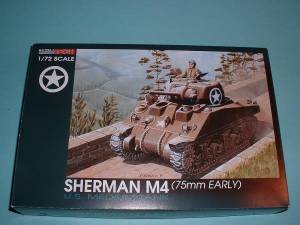 |
History
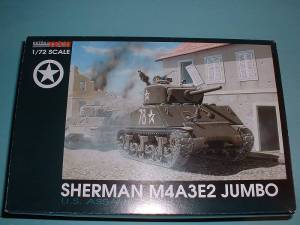 One
of the most famous tanks of WW2, the Sherman was also one of the most
mass-produced. They were the most important US Army armored vehicles produced
in huge quantites and Sherman tanks served in many armies long after the
end of WW2. More than 55000 Sherman tanks of all versions were produced.
The development of Sherman medium tank was started in 1941 at which time
the new T6 medium tank prototype based on experience gained with the M3
tank was built in. The new tank, known as the M4 medium tank was approved
for the service in October 1941. One
of the most famous tanks of WW2, the Sherman was also one of the most
mass-produced. They were the most important US Army armored vehicles produced
in huge quantites and Sherman tanks served in many armies long after the
end of WW2. More than 55000 Sherman tanks of all versions were produced.
The development of Sherman medium tank was started in 1941 at which time
the new T6 medium tank prototype based on experience gained with the M3
tank was built in. The new tank, known as the M4 medium tank was approved
for the service in October 1941.
The Kit
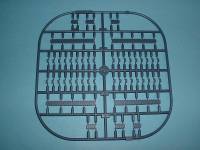 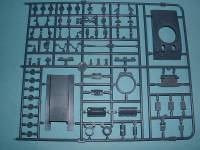 Due
to their similar construction and basic parts break-down, I've decided
to put these two Shermans in the same review. There are approximately
180 injected molded parts - approximately because each version uses -
or doesn't use - parts that are included in the tree. Both kits also come
with a fret of photoetch containing 6 pieces. The two biggest differences
between what's included in each kit is dependent on the turret, as well
as the decal options. Those decals being very well printed and in register. Due
to their similar construction and basic parts break-down, I've decided
to put these two Shermans in the same review. There are approximately
180 injected molded parts - approximately because each version uses -
or doesn't use - parts that are included in the tree. Both kits also come
with a fret of photoetch containing 6 pieces. The two biggest differences
between what's included in each kit is dependent on the turret, as well
as the decal options. Those decals being very well printed and in register.
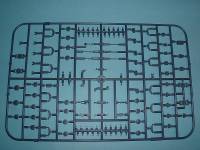 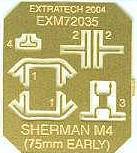 Assembly
starts with each bogey - and there are three of them two assemble per
side, giving a total of six assemblies. I haven't found anything to complain
about these kits, except in the bogey area. The part of the bogey that
keeps the tension in the tracks, at the top of each assembly, was in reality
a piece of steel, bent to form. This means that the area between this
piece of steel and the top of the main bogey "arm" should be
hollow. On the kit, this area is molded solid. For a kit of this magnitude
having only that area to complain about is a good sign. It's actually
not too difficult to drill, carve and file out these areas - time consuming,
yes - but not past the typical modeler's level of expertise. Assembly
starts with each bogey - and there are three of them two assemble per
side, giving a total of six assemblies. I haven't found anything to complain
about these kits, except in the bogey area. The part of the bogey that
keeps the tension in the tracks, at the top of each assembly, was in reality
a piece of steel, bent to form. This means that the area between this
piece of steel and the top of the main bogey "arm" should be
hollow. On the kit, this area is molded solid. For a kit of this magnitude
having only that area to complain about is a good sign. It's actually
not too difficult to drill, carve and file out these areas - time consuming,
yes - but not past the typical modeler's level of expertise.
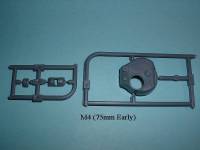  One
the bogey assemblies are put together, then the lower hull pieces are
glued together and the bogies assembled to them - along with other parts.
The instructions then have you add the tracks, which is a personal preference.
Some people will wait to put the tracks on after painting the main components,
while others will add the tracks prior to final painting. It's your preference. One
the bogey assemblies are put together, then the lower hull pieces are
glued together and the bogies assembled to them - along with other parts.
The instructions then have you add the tracks, which is a personal preference.
Some people will wait to put the tracks on after painting the main components,
while others will add the tracks prior to final painting. It's your preference.
Assembly then continues with adding the upper hull, followed by gluing
the turret pieces together. Once that is accomplished then it is added
to the main part of the tank, along with all the rest of the small parts.
Everything on these models is very well molded.
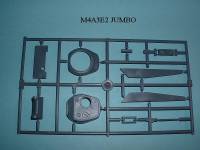  There
are four different M4s catered for on its decal sheet - two British, one
Canadian and one from the US - while there are naturally another different
four catered to on the M4A3E2 decal sheet - one French and the rest US. There
are four different M4s catered for on its decal sheet - two British, one
Canadian and one from the US - while there are naturally another different
four catered to on the M4A3E2 decal sheet - one French and the rest US.
Conclusion
These are superb kits. Some have balked at the price - going for around
US$18 - but what is present in each kit is superb, and there truly is
no aftermarket needed. Since these are the first of the "new breed"
1/72nd injected Sherman kits, they come at a great time and should prove
to be popular. Built out of the box these kit will look awesome. Definitely
recommended.
My thanks to Eduard for the review
sample.
|
|
